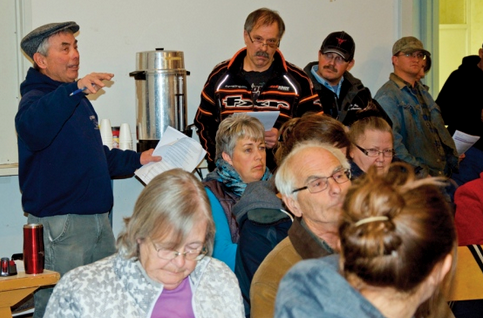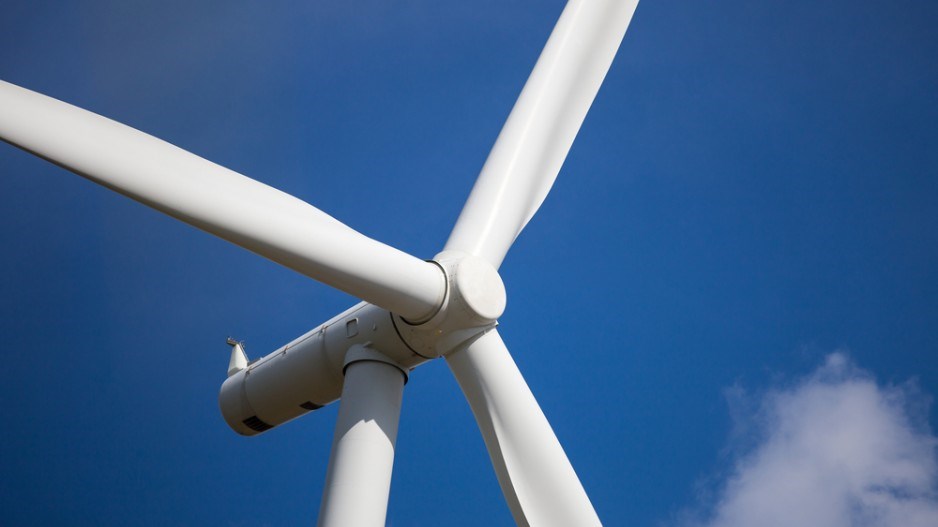Renewable Energy Systems Canada’s proposed wind energy project that would see up to seven turbines built northeast of Charlie Lake near Fort St. John has raised the ire of local residents.
About 130 people crammed into Montney Recreational Hall this week to voice their concerns. Montney resident Delbert Benterud organized the emotionally-charged public meeting as a platform for neighbours to come together and express opinions on the project, which were by and large voices of opposition.
“We’re going to see these things all over the whole valley,” said Lorna Wollen, who lives in the property next to the proposed turbines.
“It should be noted that a maximum of seven turbines would be installed, which is considered small scale. It might be small scale for you guys in Ontario, but this is our valley, and we don’t want to see these 600-foot things looming over us forever. I don’t.”
Mike King shared her sentiment, and argued that enough power is coming out of the region.
“Hydro’s way over capacity, they’re huge over capacity here, we don’t need this,” he said.”
Proponent Renewable Energy Systems Canada is planning to build the wind farm near the 254 and 275 roads, and was invited to speak to residents’ concerns. Development manager Patrick Henn outlined the project before opening the floor to a question-and-answer session.
“There’s been things that have been said about human health issues, impacts from wind turbines, infrasound, low frequency noise... it’s something that we’ve been hearing a lot about,” he said.
He assured the crowd that there’s been “a lot of study on this,” and that the “credible” experts have concluded there are no adverse impacts to health resulting from nearby wind turbines.
“In all cases what they say is that the scientific evidence and human experience concludes that wind turbines are not harmful to human health,” he said.
His comments were met with some chuckling in the crowd.
“I don’t know why you’re laughing. Health Canada has said this, the chief medical officer of health in Ontario has said this... the Journal of Environmental Medicine has done a critical review of all of the literature that exists,” Henn responded.
He offered printouts of the studies to the audience.

Mike King (left) shared his thoughts on the project at Tuesday's public meeting about a proposed wind energy project in Montney. 'Hydro's way over capacity,' he says. 'We don't need this.' | Photo: Bronwyn Scott
Proponent Renewable Energy Systems Canada is planning to build the wind farm near the 254 and 275 roads, and was invited to speak to residents’ concerns. Development manager Patrick Henn outlined the project before opening the floor to a question-and-answer session.
“There’s been things that have been said about human health issues, impacts from wind turbines, infrasound, low frequency noise... it’s something that we’ve been hearing a lot about,” he said.
He assured the crowd that there’s been “a lot of study on this,” and that the “credible” experts have concluded there are no adverse impacts to health resulting from nearby wind turbines.
“In all cases what they say is that the scientific evidence and human experience concludes that wind turbines are not harmful to human health,” he said.
His comments were met with some chuckling in the crowd.
“I don’t know why you’re laughing. Health Canada has said this, the chief medical officer of health in Ontario has said this... the Journal of Environmental Medicine has done a critical review of all of the literature that exists,” Henn responded.
He offered printouts of the studies to the audience.
Sam Fallin, a Montney resident, asked if the studies conducted on noise levels take into account the hearing impaired, who lose the ability to hear high frequency sounds and become more sensitive to low frequency sounds such as those resulting from a wind turbine.
“The annoyance topic... does the study take into consideration that could be caused by someone with hearing loss, because of the low frequency noise that’s being generated by the wind turbine combined with the wind noise, and their inability to hear higher frequencies, could cause more annoyance?” Fallin said.
He added: “They absolutely would hear low frequency noises better because they’ve lost the ability to hear high frequency noises.”
Henn couldn’t respond immediately to the question, but indicated he didn’t believe the studies took into consideration the annoyance level of individuals suffering hearing loss.
In answer to comments about how there’s enough energy coming from the region already, Henn replied “any utility has to plan in advance.”
“This project, if ever it would happen, would be only operational in 2018, that’s in three years from now,” he said.
“You always have to think in advance a little bit. If something happens... if Site C is delayed, if anything like that (happens), you might have an interest in getting power,” he said.
For the questions he couldn’t knowledgeably answer on the spot, Henn took notes and committed to providing the residents with responses.
BC Hydro spokesman Bob Gammer confirmed to the Alaska Highway News that, “Currently, we have an energy surplus in B.C.”
He added that the utility expects long-term demand to keep growing.
“Keep in mind that short-term demand and supply can be impacted by several factors like a drop in industrial activity, a warm winter and higher hydro system water inflows,” he said.
RES Canada is taking advantage of Hydro’s standing offer program for small clean energy projects to add more energy to the grid.
The program, according to Gammer, is a requirement for BC Hydro through the Clean Energy Act.




